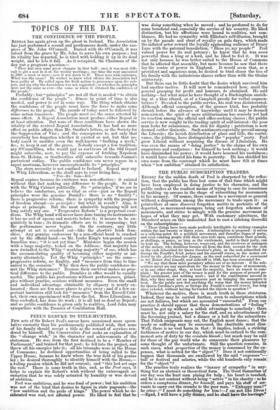TOPICS OF THE DAY.
TILE CONFIDENCE OF THE PEOPLE.
Rxriat has again given up the ghost in Ireland. The Association has just performed a second and posthumous death, under the aus- pices of Mr. John O'Connell. Buried with the O'Connell, it was raised from the grave by M. Sohn to serve his own purpose ; but its vitality has departed he is tired with holding it up in its dead weight, and he lets it fr:11. As it reexpired, the Chairman of the day put a pregnant question- " They had seen some great changes in that hail: once it was most diffi- cult to get a seat in it at the weekly meetings ; one time the rent amounted to 600t. a week or more ; now it was down to 5L These were wide extremes. What was the cause ? He wished to know what offence the Association had been guilty of. He called upon the Irish nation to pronounce upon the sub- ject, and say why the Association was not supported ; or whether its principles were not the same as ever—the same as when it obtained the confidence of the people." Probably; but" principles" are not all that is needed "to obtain the confidence of the people " : fitness in point of time is also needed, and power to act in some way. The thing which obtains the confidence of the people must have the force to make some difference to the people. The parade of today must be followed by some action tomorrow. The Reople must see the cause attested by some effect. A Repeal Association must produce either Repeal or at least attention. But none of these conditions have shown the Vitality of the revived Repeal Association. It has had no more effect on public affairs than Mr. Oastler's letters, or the Society for the Suppression of Vice ; and the consequence is, not only that everybody has forgotten whether it existed or not, but that no- body cared to sacrifice even the well-known "farthing a week," &c., to keep it out of the grave. Nobody except a few tradition- ary O'Connellites, who would pay as survivors of the Old Guard might subscribe, now, to pay the expense of fetching Napoleon from St. Helena or SOutheotites still subscribe towards Joanna's parturient outlay. The public confidence can never repose in a oaput mortuum, however unexceptionable its "principles." The stern necessity is not con ifu ed to Ireland. Repeal may say to Whig Liberalism, as the skull says to your living face, " Fai—Es : Sum—Ens."
Repeal expires because its existence was non-effective : it existed without that fact making any difference to the people. So it is with the Whig Cabinet politically. Its principles,' if we are to believe the conductors, are as vital as ever—just as the Repeal principles were the genuine Daniel's : there is no " finality " ; there is progressive reform ; there is sympathy with the progress of freedom abroad—in principle ; but what in result ? Alas, it stops at principle. But the most admirable beginning will not long satisfy any one. "Progressive Reform" is a perpetual exor- dium. The Whig band will never have done tuning its instruments: it has no end of operas and motetts before it; it means to be ex- quisitely in tune ; its dramatic effects are to be surpassing; but the performance never begins. On the contrary, any little attempt at act is crushed out—like the abortive Irish fran- chise. Any genuine endeavour by a non-official hand is crushed out by the official hand—as Mr. Locke King's ten-pound county franchise was ; "it is not yet time." Ministers began the session with a large majority, tested on the Address : that majority has now dwindled to the -Whig " working majority" of one, which has the accommodating quality of becoming either majority or mi- nority alternately. Yet the Whig " principles " are the same— progressive reform, no finality, and "measures from time to time suited to the occasion." Why then does the public confidence de- sert the Whig statesmen ? Because their survival makes no prac- tical difference to the public. Dumbies in office would be equally u seful. The public has professions without performances princi- ples without practice, sessions without measures. Even performances, small and individual advantage obtainable by cliquery is nearly ex- hausted: there are few more places to give away ; and if a few ex- pectant barristers still look for " measures" from the Russell Cabi- net, their own appointment will close the list. Mere Liberalism as thus embodied, has done its work ; it is all but as dead as Repeal; and as public confidence is given only to realities, Lord John may sympathize with the Premier of Conciliation Hall.


























 Previous page
Previous page